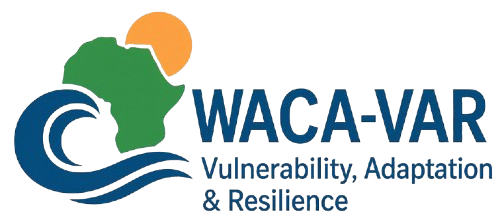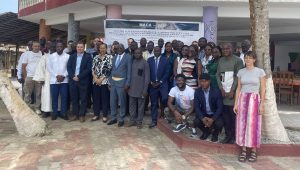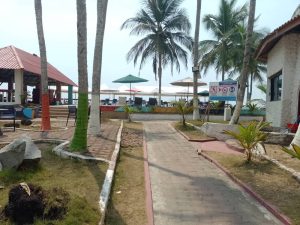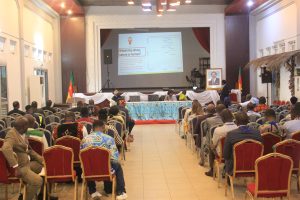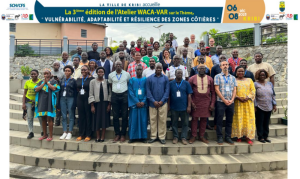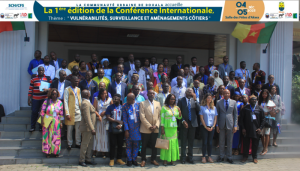Background
The West and Central African (WCA) coast is a low-lying coastal area with flourishing and functioning ecosystems with multiple ecosystem services. But growing population and economic activities in the form of often-unplanned urbanization and over-exploitation of natural resources, coupled with climate change are putting pressures on the West African coastal ecosystems. As a result, the WA coastal areas are undergoing increasing coastal erosion, flooding, sea-level rise, and pollution leading to deaths, loss of assets, and damages to critical ecosystems and their resources. A major finding from a regional study informs about risks related to future coastal urban concentrations and associated population growth, economic and infrastructures development in the changing climate. Therefore, the ability to anticipate and strategically plan and manage the WA coastal areas’ development is crucial.
To meet the urgent need to protect the WCA coastal areas from climate change impacts, the West African Coastal Areas Program (WACA) was developed by the World bank. This program supports the establishment of the WA Coastal Regional Observatory (WARCO) and the WA Coastal Master Plan (SDLAO) which involves 12 countries (From Mauritania to Nigeria). The WARCO, with its headquarters in Dakar, Senegal was set up by the West African countries in 2018 with the mandate to support, improve and promote scientific and technical knowledge; provide tools for understanding and managing coastal areas; establish a sustainable and integrated coastal policy; organize proposal of the observatory. Whereas the SDLAO is saddled with identifying coastal area issues and national coastal risks in a wide context, by emphasizing interstate solidarity and reciprocity for shoreline management. Also, it has the responsibility to identify priority coastal issues and analyze the performance of the government’s existing instruments for the management of different issues.
These aforementioned programs will require reliable and up-to-date information, shared and made available at the various decision-making levels to improve the strategic quality of decisions related to the development, occupation, and conservation of WA coastal areas. So, identifying climate-related risks on the WA coast is crucial to managing potential risks promptly, but this is largely difficult in West African countries where data, expertise and economic resources are limited.
Scientific objectives
The overarching objective is to provide scientific knowledge on coastal issues and data/tools for understanding and managing West Africa coastal environment; strengthen the West African Regional Coastal Observatory (WARCO) by building on the existing initiatives in the sustainable management of the West African coastal region under global change, and develop human capacity of current managers, train future West African coastal experts and young researchers on developing right tools and models to improve the sustainable management of the West African coastal region.
The overarching objective is supported by the following Specific Objectives (SO):
SO1 – Improve knowledge on the present and future coastal vulnerabilities of the West African coast by identifying and investigating regional “hot-spots” of risks, where more comprehensive modelling can be deployed based on existing data, scientific observatories, field measurement campaigns and modelling.
SO2 – Provide new data, information, and tools that will be useful to the investors, local and regional actors (including coastal communities) to improve spatial planning and management of WA coastal areas, which will be linked to the WARCO and State of the Coast Report (SDLAO).
SO3 – Develop capacities of local and regional actors (including postgraduate (i.e., MSc, PhD, and Postdoc) through training of current managers, future West African coastal experts and young researchers.
WACA-VAR project structure
The WACA-VAR program is focused on improving knowledge about future sea levels (both relative sea levels and extreme sea levels), permanent and episodic coastal erosion and flooding hazard and associated risk to critical coastal infrastructure at the regional scale with higher resolution at local hotspots along West Africa coastal countries and deliver all this information to West Africa Regional Coastal Observatory (WARCO) for West African decision-makers dealing with on-the-ground adaptation needs at local and regional scales. The project plans to organize local and regional workshops and training sessions (in-person and online) in conjunction with WARCO for the larger WA community, where information and products will be disseminated in light of interests
and needs. Thus, the WACA-VAR project is structured into 3 (three) Work Packages (WPs) or themes as follows:
Theme 1 focus on improving/providing scientific knowledge on the WA coastal vulnerability and mechanisms of sea-level change with a primary focus on processes leading to a spatially inhomogeneous pattern of regional coastal vulnerabilities and sea-level change by looking at the social, ecological, and geophysical vulnerabilities aspects.
Theme 2 provide WARCO with the information knowledge and tools necessary to understand and manage coastal areas. These products will be useful for (a) local and regional actors (including coastal communities) to inform about regional strategies/ investments; (b) the State of the Coast Report (SDLAO); (c) relevant national and local decision-makers. Further, in conjunction with the WARCO, several local workshops (first, a preliminary participative workshop with main stakeholders to define what kind of tools/products are needed) will be organized at the locations of selected hotspots. Relevant tools that will gather decision-relevant scientific information, to be hosted and coordinated by CSE/WARCO, will be designed. Further, a socio-ecosystem model for describing and understanding the coastal dynamics of West Africa from a multidimensional perspective and predicting future coastal changes will be developed for the decision-makers.
Theme 3 will facilitate the capacity building of local players and West African coastal experts. It will (a) build up African junior research groups, (b) mentor of postdocs and (c) strengthen structured graduate programs training dedicated to coastal and marine environmental management in the WA universities such as the University of Cape Coast (Ghana) WB-financed Africa Centre of Excellence in Coastal Resilience; University of Douala (Cameroon)’s Integrated Coastal Zone Management master and doctorate programs; Omar Bongo University (Gabon)’s master program (GIELM); Cheikh Anta Diop University (Senegal)’s Integrated management and sustainable development of West African Littoral master
program (GIDEL), Master GAED and coastal management related graduate programs of others universities and research institutes from countries under the jurisdiction of WARCO.
Relevance of the consortium
The WACA-VAR project is strategically conceived to build long-term coastal adaptability and resilience along the West Africa coast. It aims to develop studies that would lead to the formulation and implementation of innovative and sustainable plans and policies for the management of the West Africa coastal areas and establish value-added relative to the World Bank West Africa Coastal Areas project objectives. The study will provide a basis for understanding and mitigating coastal vulnerability over a range of vital perspectives, from modelling inputs to development solutions. It will support present assets and strengthen the resilience of coastal communities of the WA. It will further strengthen the World Bank goal of developing multi-sectoral investment planning processes, culminating in WACA Multi-Sector Investment Plans (MSIPs). Also, the proposed research approach is expected to have a strong impact in terms of strengthening West African national capacities in the study and management of coastal vulnerabilities. The project teams are mixed, from IRD and linked African universities, will also involve actions requiring specific support: organization of training workshops on topics related to the research carried out, reception and supervision of master’s trainees, supervision and support of theses and short stay for research and data analyses in partners’ laboratories in Europe and Africa. Finally, WACA-VAR will be unique in integrating various scientific communities to address the impact of coastal vulnerability and a rising sea level for WA coastal society in a comprehensive and integrative way.
Expected Benefits
- Develop and/or update WCA coastal master plans using the information and data produced.
- Building the potential resilience capacity of the people living in coastal areas.
- Strengthen the human capacity of West African experts working in the field of coastal risk assessment and
management and adaptation strategies.
Read this article for details: https://www.ird.fr/irn-waca-var-west-african-coastal-areas-mapping-vulnerability-adaptability-and-resilience-changing
